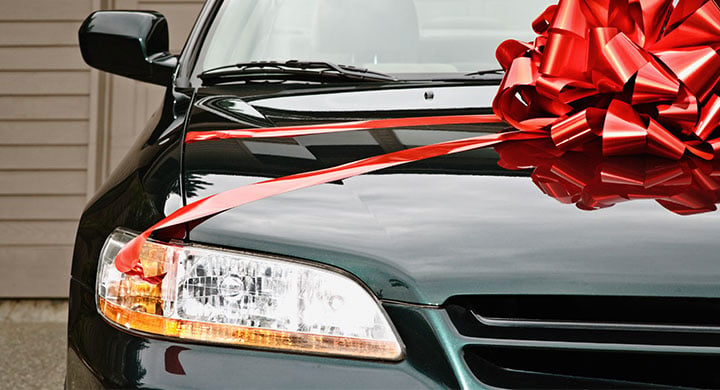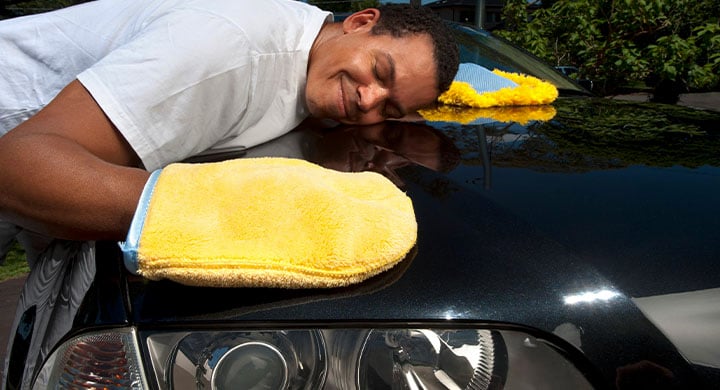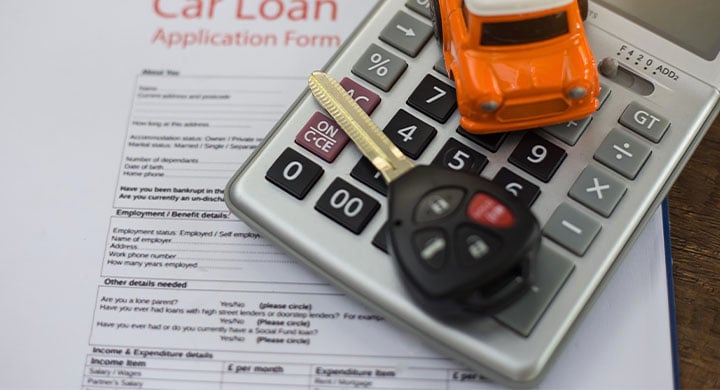The lights dim. The crowd brims with anticipation. Thundering taiko war drums rumble the arena floor. Ladies and gentlemen and more, sponsored by Toggle® Auto, this is LEASE vs. BUY! The knockdown, dragout debate of the century.
Is it better to lease or buy a car? Debating this can feel a lot like a heavyweight boxing match going on inside your head. Owning stuff feels really good. But leasing usually has a cheaper invoice every month. Both are smart, but both can have unexpected costs. Which one is the smarter move? What’s a better bang for your buck? It’s time to settle this, get you a car and score you some modern, flexible auto insurance from Toggle. DING! DING! The gloves are touched, and the juggernauts are primed for battle.

ROUND ONE: BUY COMES OUT FIGHTING!
There’s a long-term stamina associated with Buying because much of the cost is fixed, you can drive as many miles as you like and you have an asset you can use for borrowing money and reselling. You also get to have fun selecting all your specific customization options when ordering a brand-new car. Leasing is typically cheaper by the month, but you will not receive as much equity as you do by purchasing a vehicle. And if you exceed the mileage limit (typically 10,000 miles a year), they usually whack you for every mile over. Whopper surcharges such as 25 cents a mile are not uncommon, so Buy will decidedly win this bout if you like going on long road trips, enjoy piling up piles of equity and calling it your own.
 One sucker punch experienced by lessees are the ‘hidden fees’ and mileage restrictions. The “normal wear and tear” clause assumes you will maintain the vehicle in “good condition,” thus minimizing depreciation, as the contract will state. This term is kind of subjective and totally up to the dealer, whether you suffered a blemish or need to completely replace some part of the car. You can get hit with a knockout bill after the final car condition inspection, plus more surprise fees. Oh my! Here’s a series of firecracker potshots to your budget: monthly lease payments may seem lower at first, but expect administrative fees, taxes added on, an acquisition fee upon signing the lease agreement and a termination fee if you decide to end the lease early. Oh, did anyone mention the upfront costs? Remember those low monthly payments we hear so much about when you lease? Well the catch is, dealers require a downpayment on almost any lease deal. To get these really low, and it varies, but you usually pay a lot more upfront. Often, way more.
One sucker punch experienced by lessees are the ‘hidden fees’ and mileage restrictions. The “normal wear and tear” clause assumes you will maintain the vehicle in “good condition,” thus minimizing depreciation, as the contract will state. This term is kind of subjective and totally up to the dealer, whether you suffered a blemish or need to completely replace some part of the car. You can get hit with a knockout bill after the final car condition inspection, plus more surprise fees. Oh my! Here’s a series of firecracker potshots to your budget: monthly lease payments may seem lower at first, but expect administrative fees, taxes added on, an acquisition fee upon signing the lease agreement and a termination fee if you decide to end the lease early. Oh, did anyone mention the upfront costs? Remember those low monthly payments we hear so much about when you lease? Well the catch is, dealers require a downpayment on almost any lease deal. To get these really low, and it varies, but you usually pay a lot more upfront. Often, way more.
 ROUND TWO: LEASE COMEBACK!
ROUND TWO: LEASE COMEBACK!
Hold on! Car leasing is not on the ropes! Leasing a car still packs a financial punch. There’s typically far fewer maintenance charges or auto repair costs, although you will likely have to pay for scheduled checkups as part of the agreement. Most of the time, warranties cover part failures so your car stays relatively fresh and new no matter what. Speaking of new things, lessees have the flexibility to jump into a brand-new model when the term is up, which means they tend to enjoy that curiously nose-pleasing, fragrant, new car smell more often than people who buy. Yes, the value of a leased car depreciates, but a lot of dealers will offer you the chance to “buyout” the lease and effectively pay off the remaining value of the car. This can allow you to score a relatively late model car for a surprisingly cool, low price. Try using a quick depreciation calculator if you are wondering about this factor. (Source: Omni Calculator)

THE FINAL ROUND
So there it is. Low monthly payments, a new car every 36 months, warranty coverage and far more predictable maintenance fees plus the freedom to walk away anytime (subject to early termination fees, obviously): rabid fans of car leasing are going wild. Meanwhile, buying, while subject to more sudden and surprising car maintenance costs after the initial car warranty expires, builds equity with every payment. This gives you an ownable asset you can leverage, borrow against and resell. We recommend preparing some cost worksheets before you move forward: check these out. (Source: Consumer Finance)
One final punch that benefits both contenders: if you own your own business, such as a side hustle with LLC status, leasing or buying a car can make you eligible for favorable tax implications. you can write off the portion of the car usage attributed to your business as an expense.
This could go on all night. Both arguments have fought their way to a close match. The final decision? It’s your call, but what a fight, folks. What a fight!
This has been Lease vs Buy, heavyweight match of the century, sponsored by Toggle Auto! Whatever you decide to do, we support you being part of the Toggle adulting elite and being well researched before deciding what to do. Go for a ride, enjoy!

The information included in this blog is for informational purposes only and is not intended as professional or expert advice. It is based on research and the collective experiences of the Toggle Team and has not been verified by any academic institutions, government organizations, or world-renowned scholars, but it does make a lot of sense and we do hope you find it useful. We encourage you to use your own good judgment about what’s appropriate for you.
Links to third-party websites are provided for your convenience only. Toggle has not independently verified any of the information provided therein and makes no representations about the enduring accuracy of such information or any content.


 One
One  ROUND TWO: LEASE COMEBACK!
ROUND TWO: LEASE COMEBACK!
